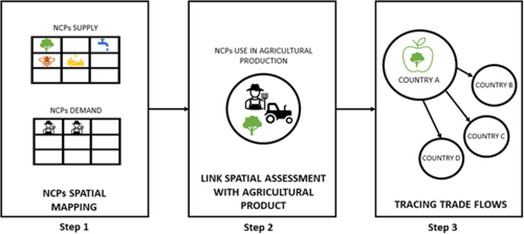Food Security
Insights from Food Security Data: The critical role of trade
6:16
This article introduces a study that seeks to measure nature's contribution to agricultural trade.
Nature provides the essential ecosystem services for survival, such as clean water, food, and raw materials. It regulates the climate, offers us spaces for recreational activities, and supports agriculture in many ways, for example, through pollinators. Without these contributions of nature to people, we couldn't survive.
In the past, most humans had a closer connection with nature and were well aware of our dependency on it. Nowadays, many everyday products are produced in distant parts of the world, but it only takes one trip to the supermarket to satisfy our needs. We are increasingly more disconnected from the origin of the essential resources we consume daily.
We know that ecosystem services are essential for the production and trade of the agricultural products we consume, but can we quantify how much we depend on nature for this? How, and to what extent, do nature's contributions influence international agricultural trade?
To shed light on this knowledge gap, a new study led by the Synthesis Centre (sDiv) at the German Centre for Integrative Biodiversity Research (iDiv) has developed a multi-step approach to quantify the dependency of trade on nature’s contributions to people. The term Nature's Contributions to People is use often used to describe ecosystem services.
This study is the first to explicitly analyse the relationship between the contributions of ecosystem services and international trade. Besides material contributions (e.g. raw materials), it also considers non-material contributions, such as cultural and value-based contributions (e.g., a seal of origin based on terroir).
Although it may sound complex, there are only three methodological steps for quantifying nature's contributions to international agricultural trade:
1. Spatial mapping of contributions to supply and demand
2. Linking Nature's Contribution to People to agricultural trade flows
3. Tracing trade flows.

Simplified methodological steps. NCP = Nature's Contributions to People. Source: Marques et al. 2024, 415.
Following these three steps with will generate information on how much ‘nature’ is included in a final agricultural product from the beginning of the production process to the end of the supply chain.
The importance of measuring NCP
Measuring the impact of Nature's Contribution to People on traded agricultural products can aid in their sustainable management, enhance supply chain accountability, provide valuable input for sustainable natural resource governance, and promote responsibility and equity within supply chains. In other words, industries can promote sustainable practices within supply chains by understanding the connections between traded goods and the ecosystems we rely on.
Moreover, the insights derived from this study are not only beneficial for industry stakeholders but also for scientists and consumers.
The approach and findings within this study empower consumers to make conscious choices and shift towards sustainable consumption.
On the other hand, scientists can use the steps proposed in this paper to gain valuable data for further research or to develop strategies for mitigating the environmental impact on global trade.
This article is a teaser of a journal article. Click here to read the original journal article entitled "The role of nature's contributions to people in sustaining international trade of agricultural products".
This article is a joint effort of the working group ‘sTradES—Ecosystem services, biodiversity, and anthropogenic capital embedded in internationally traded goods’ and the result of a workshop supported by the Synthesis Centre (sDiv) of the German Centre for Integrative Biodiversity Research (iDiv) funded by the German Research Foundation, among others.